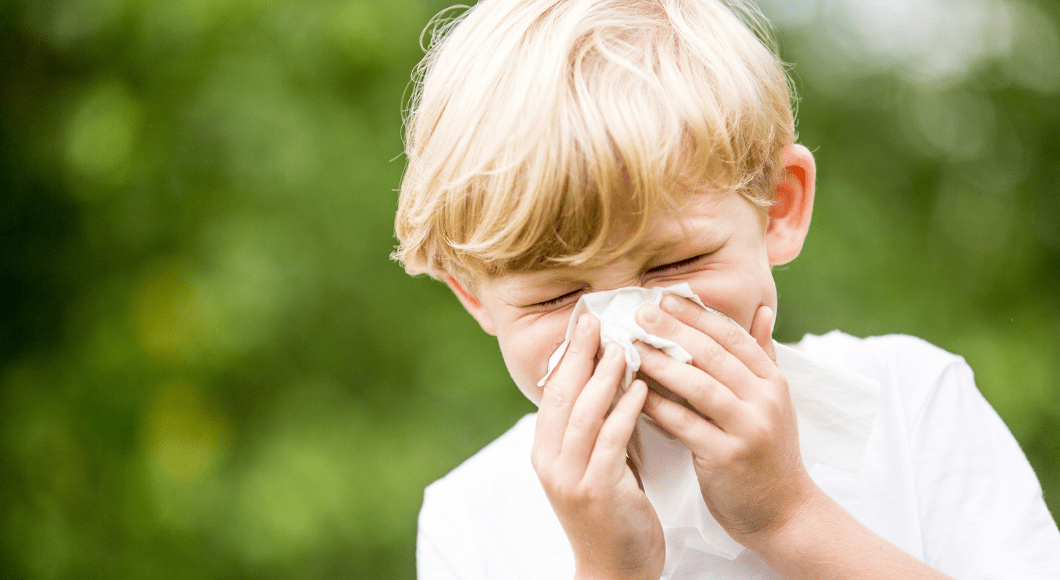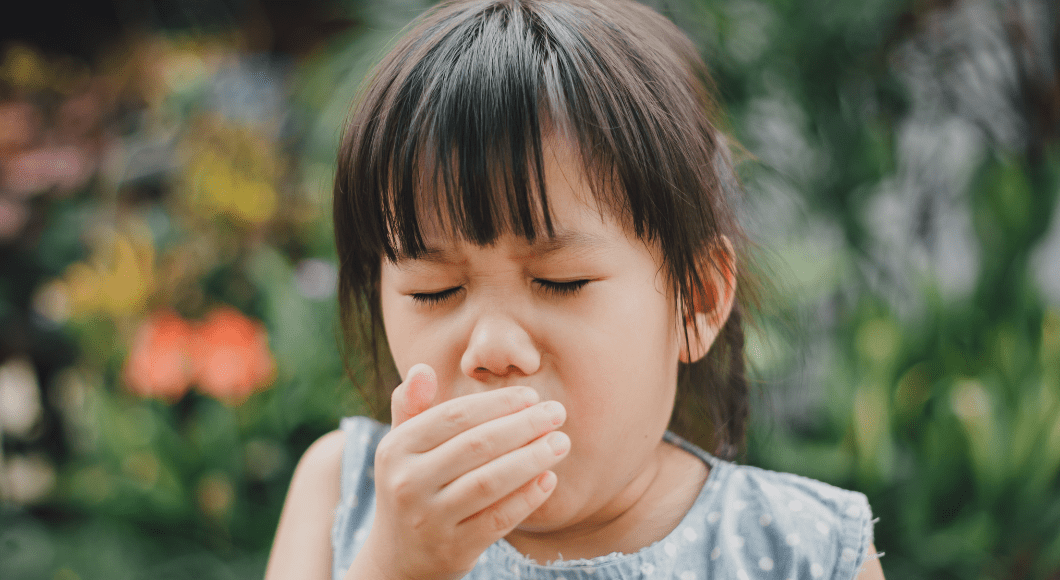Disclaimer :: This article contains sponsored content provided by TexasAllergyMD.
 Allergies in Texas can be brutal. With warm seasons nearly year-round — and many outdoor activities and sports — there’s not many months kiddos aren’t affected by a pollen or mold of some sort.
Allergies in Texas can be brutal. With warm seasons nearly year-round — and many outdoor activities and sports — there’s not many months kiddos aren’t affected by a pollen or mold of some sort.
To help parents out, we asked Dr. Mireku of TexasAllergyMD some pressing questions. As a board-certified allergist, she covered everything we could think of related to outdoor allergy triggers in Texas.
How dangerous are seasonal allergies?
Seasonal allergies are frustrating and decrease one’s quality of life. Uncontrolled seasonal allergies can lead to chronic sinus issues, ear infections, trigger asthma, and poor quality of life.
Quality of life can be impaired when:
- Your nose is congested. A plugged up nose and sinuses makes it hard for a person to get good quality night sleep, which makes for a very tired morning and day.
- Your eyes are constantly itching and watering. Seasonal allergies can lead to itchy, watery eyes and recurrent sneezing. This can decrease your child’s quality of life when playing soccer, football, or any activity that is outdoors. For some people, red and itchy eyes are more than uncomfortable: It can cause poor self esteem. Watery eyes are frustrating when applying eye make-up, and itchy eyes make it painful and annoying for people who wear contact lenses.
- Asthma is triggered. Seasonal allergies trigger most childhood asthma and some adult asthma. This becomes especially problematic when children are in sports. Their asthma will become a problem with soccer, football, track, etc. when participating in outdoor sports where pollen can wreak havoc on the allergic individual.
How should kids and parents prepare before outdoor activities?
Honestly, the best thing you can do is get an allergy skin test. It’s the most useful information you can get to determine what the allergen is.
Knowing this information helps you to be aware if you are in the “problematic” allergic season. Then, you can track pollen and identify the best times to go out during the day.
Additionally, if you need to start medications, knowing the trigger and which season it is most prevalent will equip you and the allergist with information to optimize your allergy care.
For example, once you know your allergy season, you can start a preventative medication regimen two weeks prior to your season to help control your symptoms. Additionally, a board-certified allergist can customize a personalized treatment immunotherapy plan to help to get rid of your allergies.

>> RELATED READ :: Allergen-Free Bakeries in Collin County <<
Is there such a thing as allergy prevention?
Yes, there is such a thing as allergy prevention. It can be used for techniques and protocols to prevent food allergies as well as asthma regimens to prevent asthma exacerbation or flare.
Seasonal allergy prevention can be challenging as we live and work within the same environment. Some basic prevention measures can be taken to reduce exposure such as remaining indoors during peak pollen season and keeping windows and doors closed. These are avoidance measures to prevent flares.
Immunotherapy (allergy drops or allergy shots) are used to train your immune system to tolerate allergens that you previously did not tolerate through a desensitization process.
Tips for allergy prevention include:
- Going outside when the pollen levels are lowest.
- Shower immediately after spending time outdoors.
- Apply and rinse your eyes with saline eye drops after being outdoors to help to decrease the pollen.
- Use saline nasal rinses to help with nasal symptoms triggered by allergies. The saline removes pollen from the nasal and sinus passages.
What are treatment options for seasonal allergies, particularly for children?
Treatment options for allergies for both children and adults include:
- Avoidance. This involves eliminating or reducing exposure to the allergen.
- Pharmacotherapy. This involves the use of medications to treat or prevent allergic symptoms, such as antihistamines, nasal sprays, etc.
- Immunotherapy. This treatment aims to decrease sensitivity to allergens by exposing patients to increasing amounts of the allergen over time. There are two types of immunotherapy.
- Sublingual immunotherapy: Instead of shots, allergen extracts are placed under the tongue. This is convenient and easy for most patients since there aren’t any shots or wait time at a clinic. It can be administered within the comfort of your own home. There are sublingual drops and tablets, both of which are placed under the tongue. Over time immunotherapy will reduce the severity of allergic reactions. Treatment is typically three to five years. Sublingual immunotherapy drops are typically not covered by insurance.
- Subcutaneous immunotherapy (allergy shots): Allergen extracts are injected under the skin, typically increasing in dose over time. This leads to reduced sensitivity to the allergen. Treatment usually spans several years. Initially, injections might be given weekly and then monthly. The goal is to achieve a maintenance dose, which will then be continued for three to five years. This is also an excellent mode of therapy.
What are your top tips for managing seasonal allergies, including any outdoor, sports-specific tips?
- Clothing and uniform management. Immediately change after playing outside. Have your child change out of their sports uniform as soon as possible, ideally before entering the home to avoid tracking the pollen into the home. Regularly wash uniforms after use to remove pollen and allergens.
- Sports equipment management. Use a damp cloth to wipe down equipment immediately after use in order to remove pollens that land on the surface.
- Personal care management. Shower after playing outside and wash your child’s hair to remove pollen and allergens. Alternatively, you may keep your hair covered when playing outside to avoid the pollen exposure.
Other considerations:
- Nasal saline rinses. Using a saline nasal rinse or Neti pot can help clear out allergens from the nasal passages.
- Pharmacotherapy-nonsedating antihistamines. These can be helpful if used prior to outdoor sport activities. If your child has asthma, ensure they are taking their daily preventative inhaler as prescribed by their doctor and keep your rescue inhaler on hand during sport activities.
- Educate coaches and teammates. Coaches spend a significant amount of time with your child. It is important to make them aware of your child’s allergies, so they can partner with you and your child for their allergy care.
Remember, while you can take many steps to reduce allergen exposure, complete avoidance may not be possible. Regular check-ins with an allergist can allow you to get tested to identify your allergens, help adjust treatments and offer additional recommendations based on the specific nature of your child’s allergies.
>> RELATED READ :: 10 Tips to Help Kids Cope with Seasonal Allergies in North Texas <<
Should outdoor allergies be a reason a child doesn’t participate in outdoor sports? Why or why not?
My philosophy is if your child has allergies, it is up to the parents and allergist to work together to improve the child’s overall quality of life. At TexasAllergyMD, we will work with you and your child to manage allergies. We will first work to identify the underlying cause through allergy skin testing, then implement a personalized treatment plan, which includes avoidance measures, medications, and/or immunotherapy (allergy shots or allergy drops) to desensitize you from your allergies.
Our goal is for your child to live their best life without restriction. We are able to accomplish this goal by developing a personalized comprehensive plan.
Dr. Mireku is a board-certified pediatric allergist/immunologist who has been serving patients in the DFW metroplex for more than 15 years. As an allergy sufferer herself — and the parent of two kids with seasonal and food allergies — she is passionate about providing relief for her patients.
At TexasAllergyMD, Mireku offers preventative, personalized care for allergic conditions and is devoted to serving families who suffer from environmental/seasonal allergies, eczema, asthma, and food allergies.
TexasAllergyMD is conveniently located at the McKinney/Prosper border and Southlake. It also offers virtual allergy care (telemedicine).
Dr. Mireku is also the founder of AllergenIQ, a digital health platform for serving and educating allergy patients.













